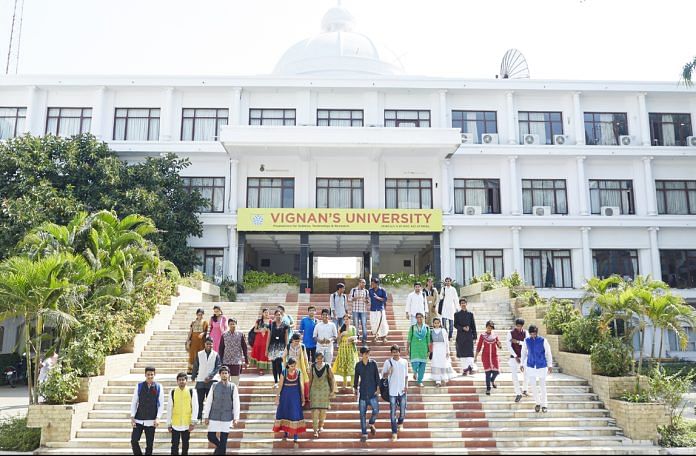HRD ministry drops UGC recommendation, scraps expert panel that gave clean chit to Vignan’s Foundation. Panel members also barred from other committees.
New Delhi: The human resource development (HRD) ministry has, in an unprecedented move, shot down a University Grants Commission (UGC) decision to extend ‘deemed university’ status to an institute in Andhra Pradesh. It has also scrapped the expert committee that gave the institute a clean chit, and barred committee members from inspecting any deemed university in the future.
In a strong communication issued to the UGC chairman — with the “approval of the HRD minister” Prakash Javadekar — the ministry has slammed the UGC committee for its failure to carry out due diligence in its inspection of the Andhra Pradesh-based Vignan’s Foundation for Science, Technology and Research, and giving it a clean chit.
The institute has been under a cloud since 2009, when the Tandon committee set up to review deemed university status for existing institutions had put it on the list of 44 institutes that were ‘unfit’ to retain the status.
The crux of the matter
A team of UGC experts visited Vignan’s Foundation on 9-11 October 2017. This committee, in its report, recommended the extension of the deemed varsity status to the institute “without any limit of time i.e. forever”, according to the HRD ministry’s communication dated 13 March 2018 accessed by ThePrint.
Then, at the meeting of its full commission on 22 December 2017, the UGC “considered and approved” this expert committee report. On 2 January 2018, the UGC forwarded the report and its own recommendation for extension of the deemed university status to the ministry. ‘Deemed university’ is a highly sought-after tag that endows an institution not just with degree granting powers, but also a stamp of quality approval that in turn draws students.
However, the HRD ministry, instead of giving it the go-ahead, made strong observations about the functioning of the expert committee. It pointed out how the inspection team simply noted the information submitted by the institute, and failed to give its remarks and verification report.
The ministry missive further noted that this particular institute was in the ‘C’ category as per the 2009 Tandon committee report, and the UGC team did not even ascertain whether the deficiencies pointed out then had been addressed or not.
“Going by the inspection report, it seems that the inspection team has not done its job properly,” the ministry letter to the UGC chairman said.
The committee’s actions had been viewed “seriously in the ministry”, and the UGC had been requested to review the institute again through “a separate inspection team”, the letter said.
It tersely added that the members as well as the co-coordinator of the committee “should not be made a part of any future inspection team” related to deemed universities. This particular committee had been engaged for many other institutes, and featured a joint secretary-level senior UGC official on it.
Neither UGC chairman Prof. D.P. Singh nor secretary Rajnish Jain responded to ThePrint’s queries. However, sources in the UGC as well as the HRD ministry confirmed that such a communication had indeed been sent out.
The rot runs deep
The Narendra Modi government has stated its intent to clean up higher education, bring in a transparent regulatory regime, and to internationalise it. But the rot runs deep in the country’s apex higher education regulator, UGC.
While the ministry order in this case refrains from making any comment on the UGC; the fact that the commission was unable to note the deficiencies in its own expert committee report and approved it brings its role into question.
Several reports have pointed to the systemic deficiencies in the UGC. They have also pointed out how the regulatory regime under the UGC is seen as corrupt, inefficient, and hugely restrictive. UGC expert committees have also been criticised often for failing to conduct proper institutional inspections, and for preferentially doling out extension of privileged status to institutes.
The four-member P.N. Tandon committee, as mentioned earlier, had called for blacklisting 44 deemed varsities. A 2011 committee of HRD ministry officials had emphatically backed the Tandon committee’s call.
Even at that time, many eyebrows were raised over how expert committees had given a clean chit to these 44 institutes in the first place, and a structure inspection regime was supposedly introduced by the UGC thereafter.




Money is involved